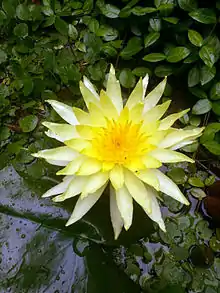Nymphaea mexicana
Nymphaea mexicana is a species of aquatic plant that is native to the Southern United States and Mexico as far south as Michoacán.[1][2] Common names include yellow waterlily, Mexican waterlily and banana waterlily.
| Nymphaea mexicana | |
|---|---|
 | |
| Scientific classification | |
| Kingdom: | Plantae |
| Clade: | Tracheophytes |
| Clade: | Angiosperms |
| Order: | Nymphaeales |
| Family: | Nymphaeaceae |
| Genus: | Nymphaea |
| Species: | N. mexicana |
| Binomial name | |
| Nymphaea mexicana | |
| Synonyms | |
|
Castalia flava (Leitn. ex A.Gray) Greene | |
Nymphaea mexicana is perhaps best known as a noxious weed in wetlands outside of its native range, such as California. It can easily invade similar aquatic ecosystems when it is introduced. The plant is attractive and has been introduced to new habitats for ornamental purposes.
Nymphaea mexicana has thick rhizomes and long, spongy creeping stolons which bear bunches of small yellow roots that resemble miniature bananas. The plant can grow from seedlings or send out new shoots from its stolons. The large, flat leaves are green with purple or brown patterning, and float on the surface of the water. The floating lotus flowers have yellow petals and pointed, star-like, greenish-yellow sepals. The flowers close at night.[3]
_1200.jpg.webp)
The plant flowers during the summer, and also during spring and fall in warmer areas. Seeds are contained in green berries which grow underwater. It grows in marshes and readily invades canals and other shallow waterways, sometimes becoming a nuisance.
The canvasback duck, Aythya valisineria, feeds on the banana-like roots of the plant.
References
- "Nymphaea mexicana". Germplasm Resources Information Network (GRIN). Agricultural Research Service (ARS), United States Department of Agriculture (USDA). Retrieved 2010-04-19.
- Biota of North America Program 2014 county distribution map
- Flora of North America, Nymphaea mexicana Zuccarini, 1832.Banana water-lily, yellow water-lily, herbe au coeur
External links
![]() Media related to Nymphaea mexicana at Wikimedia Commons
Media related to Nymphaea mexicana at Wikimedia Commons
![]() Data related to Nymphaea mexicana at Wikispecies
Data related to Nymphaea mexicana at Wikispecies
- USDA Plants Profile
- Lady Bird Johnson Wildflower Center
- California Department of Food and Agriculture